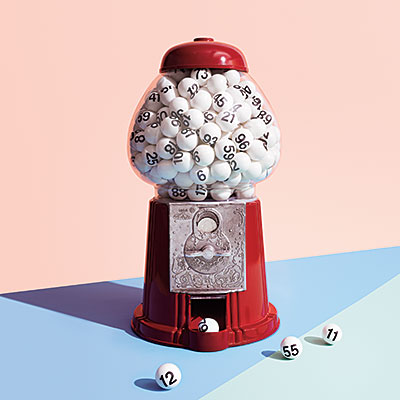
When Anna Z. moved to Chicago¸ one of the first things she did was join a meet-up group for Arabic speakers. “I love trying new things¸” she explains. “I saw this group and thought¸ ‘Why not?'” As luck would have it¸ the organizer was born and raised in Fez¸ Morocco¸ the city where Anna lived when she was learning the language. The two struck up a conversation¸ and today they’re happily married with a little boy.
Some people might say that kismet led Anna to her future husband within a week of landing in a new city. But Anna’s openness to life’s quirky possibilities put her in the right place at the right time to create her own fate.
Contrary to what most of us have always believed, luck isn’t some mysterious, ephemeral force. “There are huge chance factors that affect what happens to us, of course,” says Richard Wiseman, PhD, a psychology professor at the University of Hertfordshire in England and author of The Luck Factor. “But to a very large extent, we are responsible for much of the good fortune that we encounter.”
And some folks tend to be naturally skilled at spotting good fortune around every turn. To learn how those “lucky” souls do it, Wiseman and other experts have been studying the constellation of traits that separate them from the self-proclaimed unlucky. Their research suggests that four habits in particular can help us all catch a few more breaks.
Related: Fight Aging: 6 Secrets to Staying Young
Expect good things
The first rule of lucky people? They feel lucky, which tilts the scales of serendipity in their favor. But the reason has nothing to do with hocus-pocus, says Wiseman, who has spent 15 years researching folks’ perceptions of their fate: “People who count themselves lucky expect the best outcomes, and their expectations become self-fulfilling prophecies.”
Researchers at New York University discovered this effect among lovesick undergraduates. In the study, students who believed that they would get a date were significantly more likely to win over the object of their desire.
The simple explanation is self-assurance. If you believe that you’ll do wellwhether you’re trying to impress a crush or pitching a projectyou’re more motivated to persist until you reach your goal. Feeling lucky might even help you win the door prize at a charity dinner: The more optimistic you are about your chances, the more raffle tickets you’ll probably buy (and the more likely you’ll be to buy tickets at the next event, despite losing in the past).
Not a Pollyanna by nature? You might want to pick up a rabbit’s footseriously! Experiments have shown that lucky charms can actually work, by boosting a person’s confidence. In a 2010 study at the University of Cologne in Germany, superstitious subjects were asked to play a memory game; people who got to keep their talismans while they played scored higher than those who played without their jujus.
The researchers observed the same phenomenon among golfers who were told that they were playing with a lucky ball: The belief that they had a supernatural edge led them to putt significantly better than golfers in a control group.
Donald Saucier, PhD, associate professor of psychology at Kansas State University, encourages following any (harmless) ritual that makes you feel better when you’re nervous, from rubbing a lucky penny to donning special undies: “These optimistic gestures are good at creating comfortand that can help you perform better.”
The key, he says, is coupling your hopeful expectations with action. “If you think luck is going to take care of you entirely, you’ll do less to design your own destiny,” he explains. “But if a superstition helps you manage your emotions so you can focus on the problem at hand, that’s awesome.”
Related: 12 Counterintuitive Health Tips
Court chance
Another reason good fortune seems to find certain people is that they make themselves easy to find, says Tania Luna, a researcher at Hunter College in New York City and author of the new book Surprise: Embrace the Unpredictable and Engineer the Unexpected. “Lucky people court chance by breaking routine, saying yes more often and meeting people beyond their circle,” she notes.
Indeed, Wiseman has learned that lucky people cultivate lots of friends and acquaintances. In one study, he showed hundreds of participants a list of common last names and asked them to indicate if they were on a first-name basis with at least one person who had each surname. Of the subjects who considered themselves lucky, nearly 50 percent ticked eight names or more. Only 25 percent of unlucky people could do the same.
“Lucky people talk to lots of people, attract people to them and keep in touch,” Wiseman says. “These habits result in a ‘network of luck,’ creating potential for fortuitous connections.”
But if striking up small talk with strangers isn’t your style, you can still create that advantage, Luna says: “Reach out to an old friend you haven’t seen since high school. Or invite a colleague to join you at a new lunch spot. The idea is to move outside your comfort zone.”
Colleen Seifert, PhD, a cognitive scientist and a professor at the University of Michigan, echoes Luna’s advice to get out of your everyday rut, which could mean attending a conference, for example, or volunteering at a political fundraisereven signing up for scuba-diving lessons. “Throwing a little chaos into your life opens you up to a chance encounter,” she explains. That person could end up being your soul mate, future business partner or just someone you chat with for five minutes and never see again. But that’s OK. The goal is to stay open to possibilities.